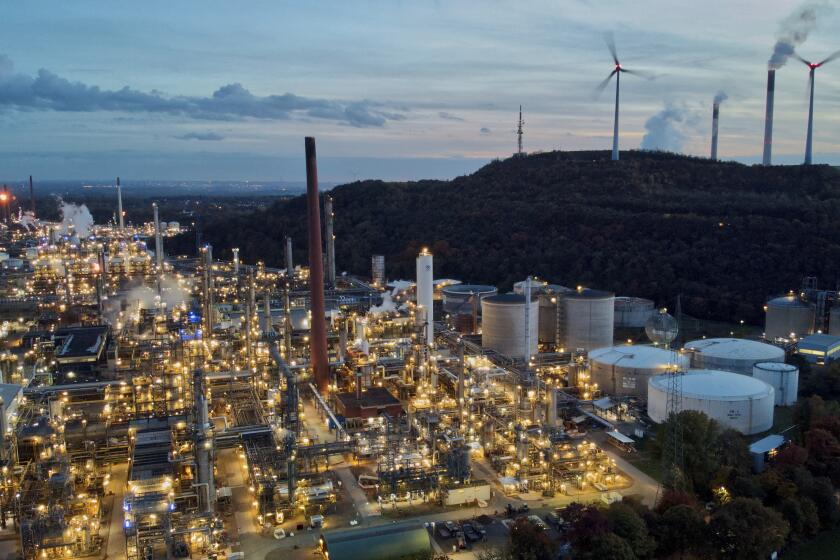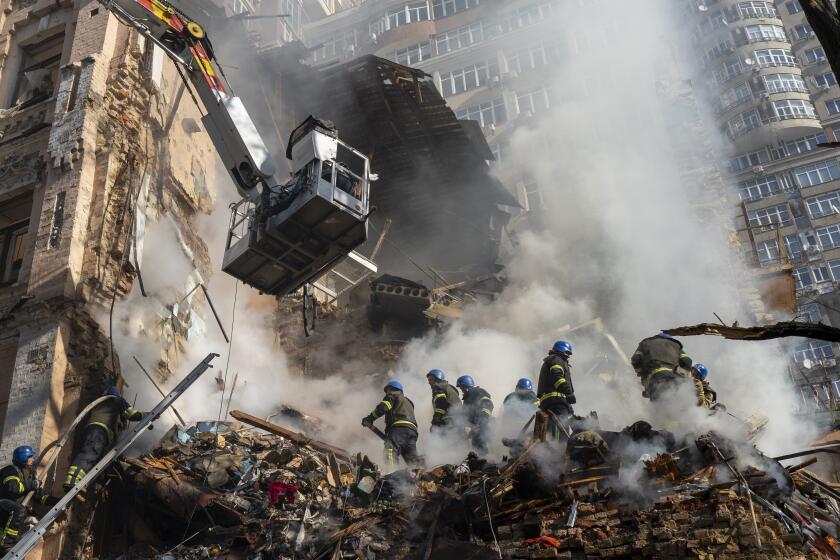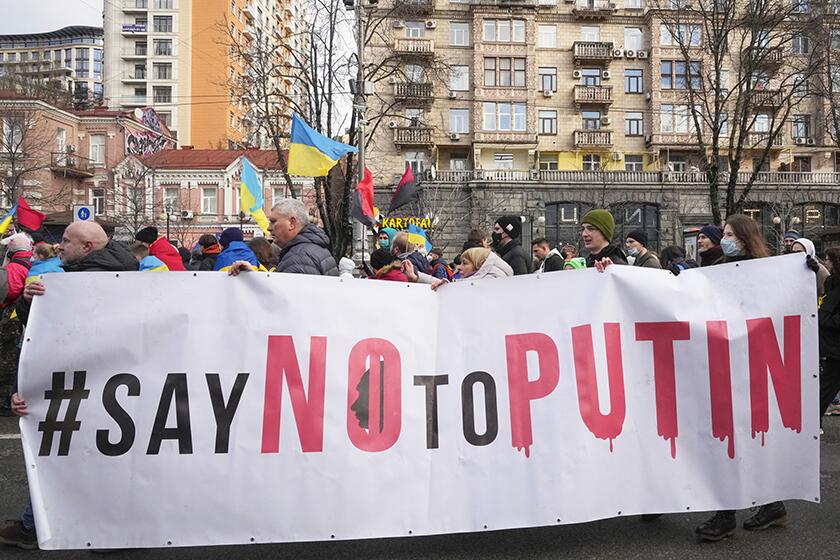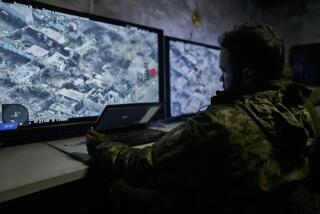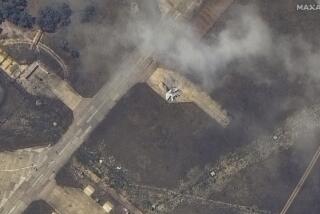Russia suspends U.N.-brokered grain export deal
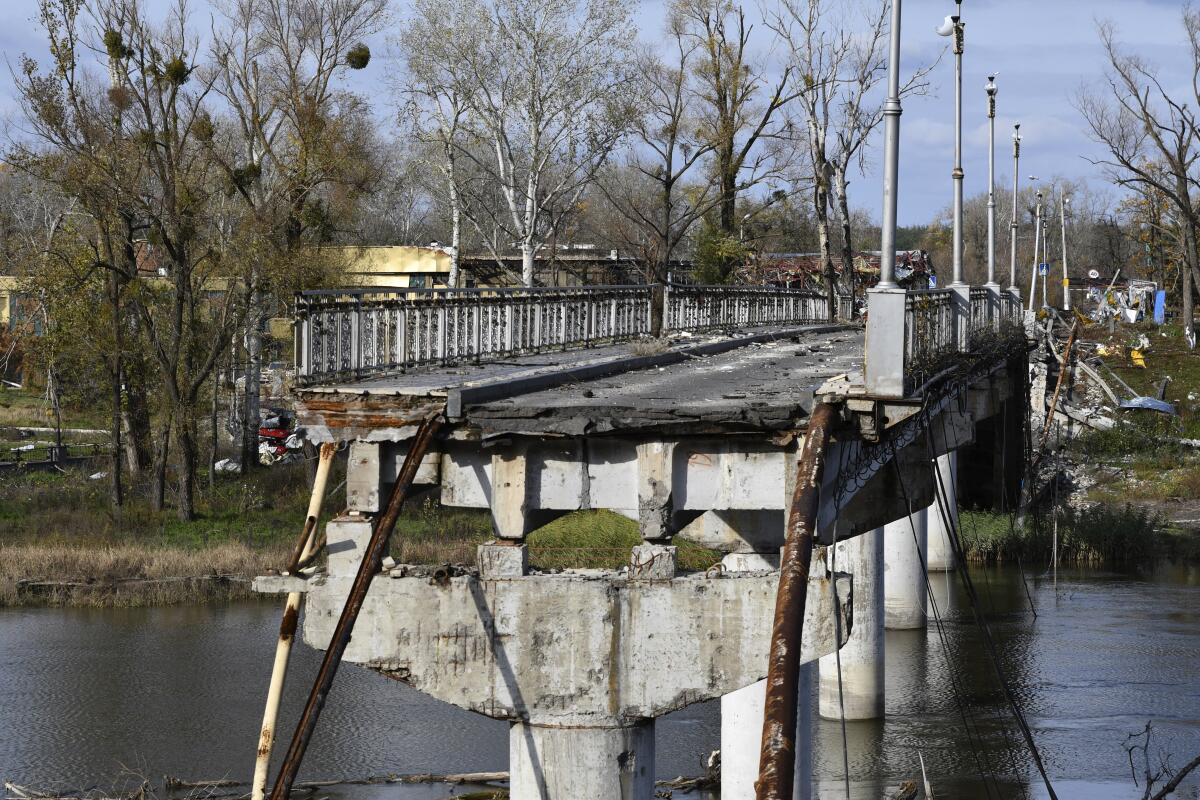
KYIV, Ukraine — Russia announced Saturday that it will immediately suspend its implementation of a U.N.-brokered grain deal that has seen more than 9 million tons of grain exported from Ukraine during the war and has brought down soaring global food prices. Ukraine accused Russia of creating a world “hunger games.”
The Russian Defense Ministry cited an alleged Ukrainian drone attack Saturday against Russia’s Black Sea Fleet ships moored off the coast of occupied Crimea as the reason for the move. Ukraine has denied the attack, saying that the Russians mishandled their own weapons.
The Russian declaration came one day after United Nations chief Antonio Guterres urged Russia and Ukraine to renew the grain export deal, which was scheduled to expire on Nov. 19. Guterres also urged other countries, mainly in the West, to expedite the removal of obstacles blocking Russian grain and fertilizer exports.
The U.N. chief said the grain deal — brokered by the United Nations and Turkey in July — helps “to cushion the suffering that this global cost-of-living crisis is inflicting on billions of people,” his spokesman said.
U.N. officials were in touch with Russian authorities over the announced suspension.
“It is vital that all parties refrain from any action that would imperil the Black Sea Grain Initiative, which is a critical humanitarian effort that is clearly having a positive impact on access to food for millions of people,” said Guterres’ spokesman, Stephane Dujarric.
Ukrainian President Volodymyr Zelensky called the Russian move “predictable.” He accused Moscow of “blockading” ships carrying grain since September. Currently, he said, 176 vessels are backed up at sea, carrying more than 2 million tons of food.
“This is a transparent attempt by Russia to return to the threat of large-scale famine in Africa and Asia,” Zelensky said Saturday in his nightly video address. He called for a tough response against Russia from international bodies like the U.N. and the Group of 20.
Ukraine’s Foreign Minister, Dmytro Kuleba, accused Russia of playing “hunger games” by imperiling global food shipments.
In Washington, U.S. Secretary of State Antony J. Blinken said the suspension was regrettable and urged “all parties to keep this essential, life-saving Initiative functioning.”
“Any act by Russia to disrupt these critical grain exports is essentially a statement that people and families around the world should pay more for food or go hungry,” Blinken said in a statement Saturday night. “In suspending this arrangement, Russia is again weaponizing food in the war it started, directly impacting low- and middle-income countries and global food prices, and exacerbating already dire humanitarian crises and food insecurity.”
Russia’s Foreign Ministry on Saturday accused British specialists of being involved in the alleged attack by drones on Russian ships in Crimea. Britain’s Defense Ministry had no immediate comment on the claim.
“In connection with the actions of Ukrainian armed forces, led by British specialists, directed, among other things, against Russian ships that ensure the functioning of the humanitarian corridor in question (which cannot be qualified otherwise than as a terrorist attack), the Russian side cannot guarantee the safety of civilian dry cargo ships participating in the Black Sea initiative, and suspends its implementation from today for an indefinite period,’’ the Russian statement said.
Ukraine’s Ministry of Infrastructure said that Ukraine has never threatened the Black Sea grain corridor, which “is exclusively humanitarian in nature,” and would continue to try to keep shipments going. It said since the first ship left Odesa on Aug. 1, more than 9 million tons of food have been exported, including more than 5 million tons to African and Asian countries. As part of the U.N. World Food Program, it said, 190 thousand tons of wheat have been sent to countries where there is hunger.
Russia also requested a meeting Monday of the U.N. Security Council because of the alleged attack on the Black Sea Fleet and the security of the grain corridor, said Dmitry Polyansky, Russia’s first deputy representative to the U.N.
Russia’s agriculture minister said Moscow stands ready to “fully replace Ukrainian grain and deliver supplies at affordable prices to all interested countries.” In remarks carried by the state Rossiya 24 TV channel, Dmitry Patrushev said Moscow was prepared to “supply up to 500,000 tons of grain to the poorest countries free of charge in the next four months,” with the help of Turkey.
Earlier Saturday, Ukraine and Russia offered differing versions on the Crimea drone attack in which at least one Russian ship suffered damage in Sevastopol, a key port on the Ukrainian peninsula annexed by Moscow in 2014.
The Russian Defense Ministry said a minesweeper had “minor damage” during an alleged pre-dawn Ukrainian attack on navy and civilian vessels docked in Sevastopol, which hosts the headquarters of Russia’s Black Sea Fleet. The ministry claimed Russian forces had “repelled” 16 attacking drones.
The governor of the Sevastopol region, Mikhail Razvozhaev, claimed the port saw a “massive attack” by air and sea drones. He provided no evidence, saying all video would be seized for security reasons.
But an advisor to Ukraine’s Interior Ministry claimed that “careless handling of explosives” had caused blasts on four warships in Russia’s Black Sea Fleet. Anton Geraschenko wrote on Telegram that the vessels included a frigate, a landing ship and a ship that carried cruise missiles used in a deadly July attack on a western Ukrainian city.
In other developments Saturday, Russian troops moved large numbers of sick and wounded comrades from hospitals in Ukraine’s southern Kherson region and stripped the facilities of medical equipment, Ukrainian officials said as their forces fought to retake the province.
Kremlin-installed authorities in the mostly Russian-occupied region have urged civilians to leave the city of Kherson, the region’s capital — and reportedly joined the tens of thousands who have fled to other Russia-held areas.
Zelensky said the Russians were “dismantling the entire health care system” in Kherson and other occupied areas.
“The occupiers have decided to close medical institutions in the cities, take away equipment, ambulances. just everything,” Zelensky said.
Kherson is one of four regions in Ukraine that Russian President Vladimir Putin illegally annexed last month and where he subsequently declared martial law. The others are Donetsk, Luhansk and Zaporizhzhia.
As Kyiv’s forces sought gains in the south, Russia kept up its shelling and missile attacks in the country’s east. Three more civilians died and eight more were wounded in the Donetsk region, as Russian soldiers try to capture the city of Bakhmut, an important target in Russia’s stalled eastern offensive.
Russian shelling also hit an industrial building in Ukraine’s southern Zaporizhzhia region.
In the latest prisoner exchange, 50 Ukrainian soldiers, including two former defenders of the Azovstal steel plant in Mariupol, and two civilians were released Saturday as part of a swap with Russia, which received 50 Russian soldiers, both sides reported.
The global energy crisis triggered by Russia’s invasion of Ukraine is causing long-lasting changes that have the potential to hasten the transition to a more sustainable and secure energy system, according to a report.
Drones, allegedly Iranian-made, are in use by Russia in its war against Ukraine, the latest example of how the Kremlin’s war forces governments to contend with a Cold War-style calculus.
Op-Ed: Russia launched a war in Georgia and suffered no consequences. That can’t happen with Ukraine
Russia’s 2008 invasion of Georgia and its 2014 annexation of Crimea prove that appeasement only begets more aggression.
More to Read
Sign up for Essential California
The most important California stories and recommendations in your inbox every morning.
You may occasionally receive promotional content from the Los Angeles Times.
